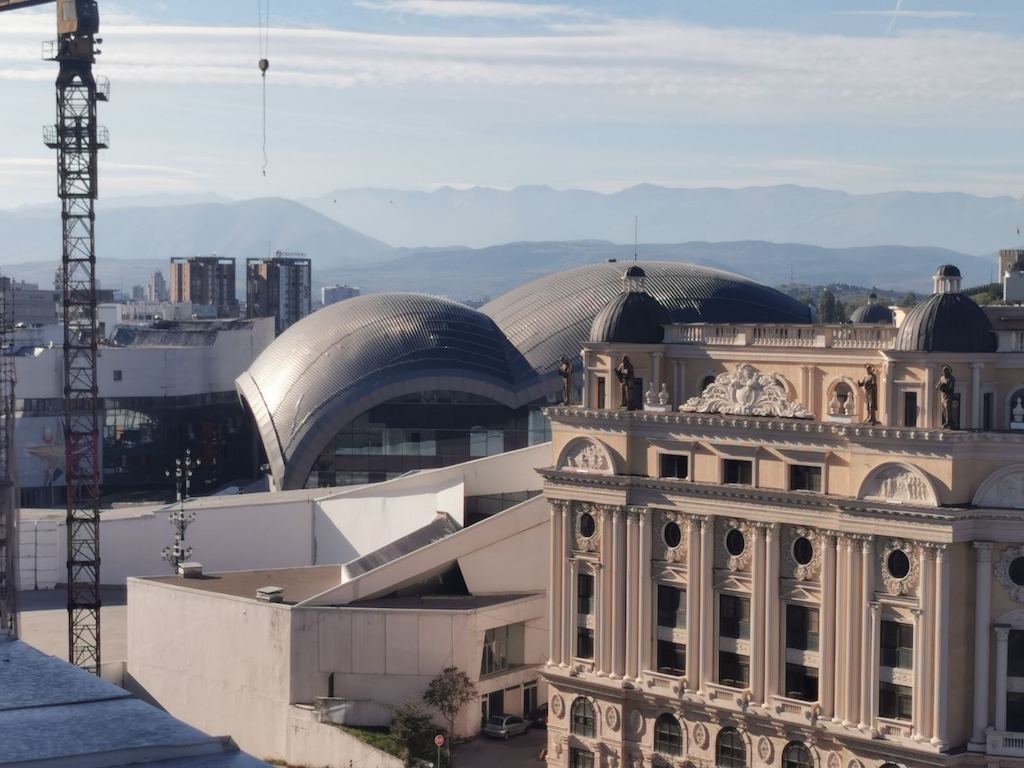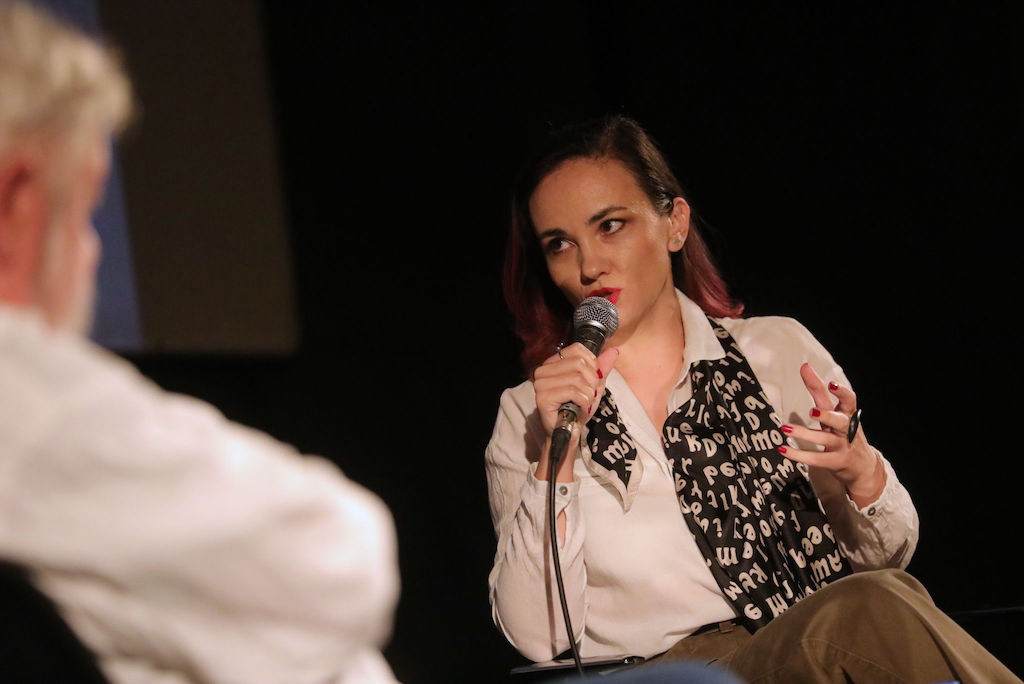Kранот, кралот на пејзажот на нашето време
Многу сакам да пешачам, неколку пати успеав и да се убедам да излезам и да го правам тоа. Но наместо релаксирана и рекреирана, се враќам дома нервозна и во грч од сиот сообраќаен метеж и урбан хаос што ми го приредува мојот град. Скопје не почитува фенг шуи, всушност, не почитува никакви правила ниту пропишани ниту природни. Да бевме поажурни со негувањето на македонскиот јазик можеби и ќе смислевме некој збор што би бил сеопфатен колку што е и хаосот во Скопје. Овде се живее по неколку недели годишно, остатокот од времето се преживува!
Зиме воздухот е презагаден, често и најзагаден во Европа, лете температурите се превисоки, па излегувањата оддома се или рано наутро или во вечерните часови, кога велиме дека „се дише“.
Урбанистичките планови се прават по мерка на урбаната мафија, поточно, да се легализираат дивоградбите или да им се даде простор на уште и уште нови згради наместо паркови, зеленила или друг јавно корисен простор. Нема доволно паркинг места, па дел од секоја улица е претворен во паркинг, единствениот организиран јавен превоз се автобусите, но тие се премалку за да се задоволат потребите. На првите капки дожд, сите излегуваат со автомобил, по еден внатре! Дури и десетминутното пешачење за скопјани е премногу, одењето пешки е последната опција! Иронично, половина град трча на традиционалниот „Скопски маратон“, но се обложувам дека барем половината од нив насекаде се движат со автомобили. Велосипедисти има, но тие, за жал, се најомразената категорија во сообраќајот, возачите ги гледаат како пречка, велосипедските патеки се ретки, па често возат или по коловозот или по тротоарите, ако не се веќе блокирани со неправилно паркирани автомобили.
Фотографирав од покривот на една зграда да го фатам тој хаос, очобол од стилови напикани во не повеќе од 200 метри воздушна линија. Тука е и кранот, кралот на пејзажот на нашето време. А таму некаде, зад сето ова, ги гледате планините… е дури таму одам кога сакам да живеам, кога сакам да дишам… се собираат по некои две-три недели годишно…
Der Kranich, König der Landschaft unserer Zeit
Ich gehe sehr gerne spazieren, ich habe es sogar ein paar Mal geschafft, mich davon zu überzeugen, rauszugehen und es zu tun. Doch statt entspannt und erholt kehre ich nervös und verkrampft von all dem Verkehr und urbanen Chaos in meiner Stadt nach Hause zurück. Skopje respektiert Feng Shui nicht, tatsächlich respektiert es keine Regeln, weder vorgeschriebene noch natürliche. Wären wir mit der Pflege der mazedonischen Sprache etwas effizienter gewesen, wäre uns vielleicht ein Wort eingefallen, das so umfassend wäre wie das Chaos in Skopje. Hier lebt man ein paar Wochen im Jahr, die restliche Zeit überlebt man!
Die Luft ist im Winter sehr verschmutzt, oft die am stärksten verschmutzte Luft in Europa, im Sommer sind die Temperaturen zu hoch, sodass man entweder früh am Morgen oder am Abend rausgehen kann, wenn wir sagen, „jetzt man kann atmen“.
Stadtplanung richtet sich danach, es der Stadtmafia Recht zu machen, genauer gesagt danach, illegale Gebäude zu legalisieren oder immer mehr Neubauten Raum zu geben, anstelle von Parks, Grünanlagen oder anderen öffentlich nutzbaren Orten. Es gibt nicht genügend Parkplätze, sodass ein Teil jeder Straße in einen Parkplatz umgewandelt wird. Die einzigen funktionalen öffentlichen Verkehrsmittel sind Busse, aber es sind zu wenige, um den Bedarf zu decken.
Beim ersten Regentropfen fahren alle mit dem Auto raus, in dem jeweils nur eine
Person sitzt! Selbst ein zehnminütiger Spaziergang ist zu viel für die Bewohner*innen von Skopje, gehen ist die letzte Option! Ironischerweise läuft die Hälfte der Stadt beim traditionellen „Skopje-Marathon“ mit, aber ich wette, mindestens die Hälfte von ihnen fährt die Strecke mit Auto. Es gibt Radfahrer, aber sie sind leider die gehassteste Kategorie im Straßenverkehr, Autofahrer sehen sie als Hindernis. Radwege sind rar, daher fahren sie oft entweder auf der Straße oder auf den Gehwegen, wenn sie nicht längst von falsch parkenden Autos blockiert sind.
Ich habe dieses Foto vom Dach eines Gebäudes gemacht, um das Chaos einzufangen, ein Schandfleck architektonischer Stile, eingepfercht in höchstens 200 Meter Luftlinie. Da ist auch auch der Kranich, der König der Landschaft unserer Zeit. Und irgendwo hinter all dem siehst du die Berge … dorthin gehe ich, wenn ich leben will, wenn ich atmen will … diese Momente zusammengenommen ergeben vielleicht zwei oder drei Wochen im Jahr …
Übersetzung: Ivana Mahovska
The Crane, King of the Landscape of our Time
I really love walking, several times I even managed to convince myself to go out and do it. But instead of feeling relaxed and invigorated, I return home agitated and tensed up from all the traffic jams and urban chaos that my city throws at me. Skopje does not follow feng shui rules, in fact, it does not respect any rules, neither written nor natural. If we were more efficient when it comes to nurturing the Macedonian language, perhaps we would have come up with a word that would be as pervasive as the chaos in Skopje. One can really live here only a few weeks a year, the rest of the time one can only survive!
In winter, the air is too polluted, often it is the most polluted in Europe, in summer the temperatures are too high, so leaving the house is an option either early in the morning or in the evening, when we say “one can breathe now“.
Urban planning is done to accommodate the urban mafia, more precisely, to legalize illegal buildings or to give space to more and more new buildings instead of parks, greenery, or other useful public space. There are not enough parking spaces, so part of every street is turned into a parking lot, the only organized public transportation is the buses, but they are too few to meet the needs. At the first drops of rain, everyone goes out by car, only one person inside! Even a ten-minute walk is too much for the citizens of Skopje, walking is the last option! Ironically, half of the citizens run in the traditional “Skopje Marathon“, but I bet at least half of them go everywhere by car. There are cyclists, but they are, unfortunately, the most hated category in traffic, drivers see them as an obstacle, and cycle paths are rare, so they often ride either on the road or on the sidewalks, if they are not already blocked by illegally parked cars.
I took this photograph from the roof of a building to capture that chaos, an eyesore of architectural styles, crammed into no more than 200 meters of air. There is also the crane, the king of the landscape of our time. And somewhere, behind all this, you see the mountains… that is where I go when I want to truly live when I want to breathe… add those moments together, and you get two or three weeks a year altogether…
Translation: Daniela Spiroska
Teilen












